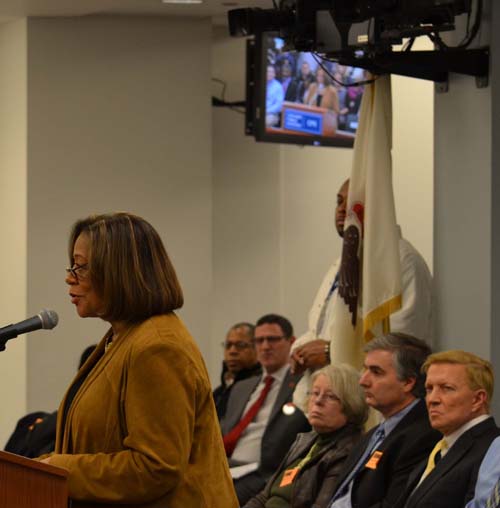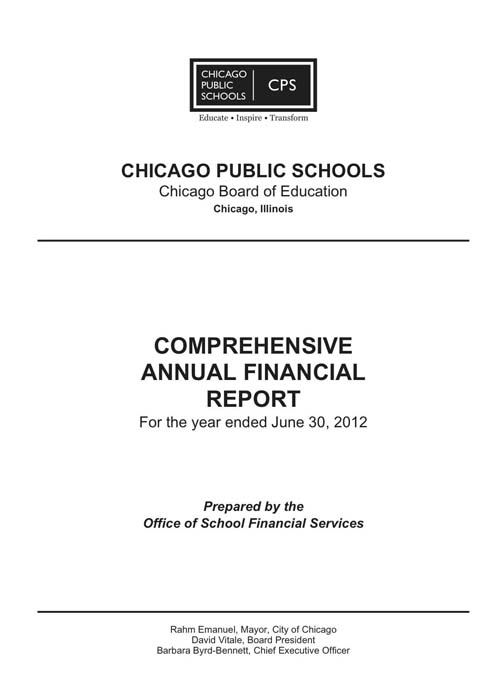FY 2012 CAFR now available on line from CPS
After a few weeks of questions, the Chicago Board of Education following its January 23, 2013 meeting, published the FY 2012 CAFR, the school system's "Comprehensive Annual Financial Report." The CAFR, which reflects the actual budget situation of the nation's third largest school system, has always been released to the public six or seven months after the end of the fiscal year which has been audited and reflects the actual performance of the schools system and any warnings from the system's outside auditors. The URL for the FY 2012 CAFR for those who can't access hot links is: http://www.cps.edu/About_CPS/Financial_information/Pages/Annualreport.aspx
 Just about the only Board of Education item that wasn't the subject of a lengthy Power Point as CEO Barbara Byrd Bennett stalled public participation at the January 23, 2013 meeting of the Chicago Board of Education was the annual audited financial report, which once again showed the CPS claims of a huge "deficit" at the beginning of the first fiscal year under Rahm Emanuel had been false. The annual CAFR went on line at midnight on January 23, as some CPS officials had promised following questions about delays. Substance photo by George N. Schmidt.By early February, Substance researchers and others will have analyzed the FY 2012 CAFR. The FY 2012 CAFR covers the fiscal year that began on July 1, 2011 and ended on June 30, 2012. The reason why the audited report is delayed is that the audits of all the system's books takes the six months between the end of the fiscal year (at midnight on June 30) and the time that the various documents in the CAFR can be compiled and the summaries composed. There were questions about the release of the FY 2012 CAFR because of the changes in CPS administration since the first appointments by Mayor Rahm Emanuel in April, May and June 2011. Emanuel was inaugurated mayor in May 2011, so the FY 2012 CAFR is the first to provide the public with an audit of the actual financial reality of his school board, as opposed to the hundreds of press statements the mayor has made or which have been provided by CPS and City Hall press offices.
Just about the only Board of Education item that wasn't the subject of a lengthy Power Point as CEO Barbara Byrd Bennett stalled public participation at the January 23, 2013 meeting of the Chicago Board of Education was the annual audited financial report, which once again showed the CPS claims of a huge "deficit" at the beginning of the first fiscal year under Rahm Emanuel had been false. The annual CAFR went on line at midnight on January 23, as some CPS officials had promised following questions about delays. Substance photo by George N. Schmidt.By early February, Substance researchers and others will have analyzed the FY 2012 CAFR. The FY 2012 CAFR covers the fiscal year that began on July 1, 2011 and ended on June 30, 2012. The reason why the audited report is delayed is that the audits of all the system's books takes the six months between the end of the fiscal year (at midnight on June 30) and the time that the various documents in the CAFR can be compiled and the summaries composed. There were questions about the release of the FY 2012 CAFR because of the changes in CPS administration since the first appointments by Mayor Rahm Emanuel in April, May and June 2011. Emanuel was inaugurated mayor in May 2011, so the FY 2012 CAFR is the first to provide the public with an audit of the actual financial reality of his school board, as opposed to the hundreds of press statements the mayor has made or which have been provided by CPS and City Hall press offices.
One of the most unusual claims that Emanuel made early in his administration was that he was "cutting bureaucracy" by several hundreds million dollars (out of a budget of roughly $5 billion). At more than one point, this reporter asked the mayor directly at a press conference for that figure, and Emanuel repeated it. His press people tried to clarify further (there has not been a total of $400 million in "administration" at CPS ever, so cutting it would have meant turning out the lights after emptying every office at 125 S. Clark St), but Emanuel stuck to his talking point the same way he continued claiming that Chicago's public schools had the "shortest school day" in the USA (and that Houston was much better than Chicago) during his publicity and legislative campaign for the "Longer School Day."
The disruptions caused by Rahm Emanuel's regular shakeups in CPS administration may have caused part of the delay this year. In less than two years, the Board of Education put into power by Emanuel in June 2011 has replaced its "Chief Executive Officer," the "Chief Administrative Officer," the "Chief Education Officer," and several other high-ranking administrative officials. The current Chief Financial Officer, Peter Rodgers, is the third since Emanuel took office (CPS has one "Acting CFO" and then another CFO for almost a year, David Watkins).
 The CAFR is now available at cps.edu.In addition to churning the CPS administration, Emanuel's Board of Education created the largest exodus of veteran administrators in CPS history when Emanuel's first "Chief Executive Officer," Jean-Claude Brizard, announced without policy analysis that the accumulated sick days of veteran staff were a waste of money and that principals and other non-union staff would lose them. The result was a massive retirement of eligible administrators, including the largest number of principals in the system's history. The reasoning for the administrators who left, in many cases interviewed by Substance, was that to remain and risk losing the time they had accumulated would cost some of them hundreds of thousands of dollars.
The CAFR is now available at cps.edu.In addition to churning the CPS administration, Emanuel's Board of Education created the largest exodus of veteran administrators in CPS history when Emanuel's first "Chief Executive Officer," Jean-Claude Brizard, announced without policy analysis that the accumulated sick days of veteran staff were a waste of money and that principals and other non-union staff would lose them. The result was a massive retirement of eligible administrators, including the largest number of principals in the system's history. The reasoning for the administrators who left, in many cases interviewed by Substance, was that to remain and risk losing the time they had accumulated would cost some of them hundreds of thousands of dollars.
The clamor that the ability of workers to accumulate sick days was a product of the Chicago Sun-Times and the Better Government Association. Both ignored the fact that the ability of workers, including principals, to accumulate sick days relieved the system of the necessity of covering for absent workers in many instances. Since the Better Government Association was taken over by former TV news reporter Andy Shaw three years ago, the reports from the group, which are routinely published as news in the Sun-Times, have often consisted of one-sided hatchet jobs. The most disruptive of all, from a policy perspective, was the "scandal" that CPS, the Sun-Times, and the BGA touted based on some serious misreadings of the ability of public workers to accumulate sick days and then cash them in upon retirement.
Analysis of the FY 2012 CAFR will begin immediately in those groups that have been doing so for the past several years. Among the, are the Chicago Teachers Union (where this reporter serves as a consultant), Substance (which has been working with a CAFR study group) and some veterans of earlier budget reports.

